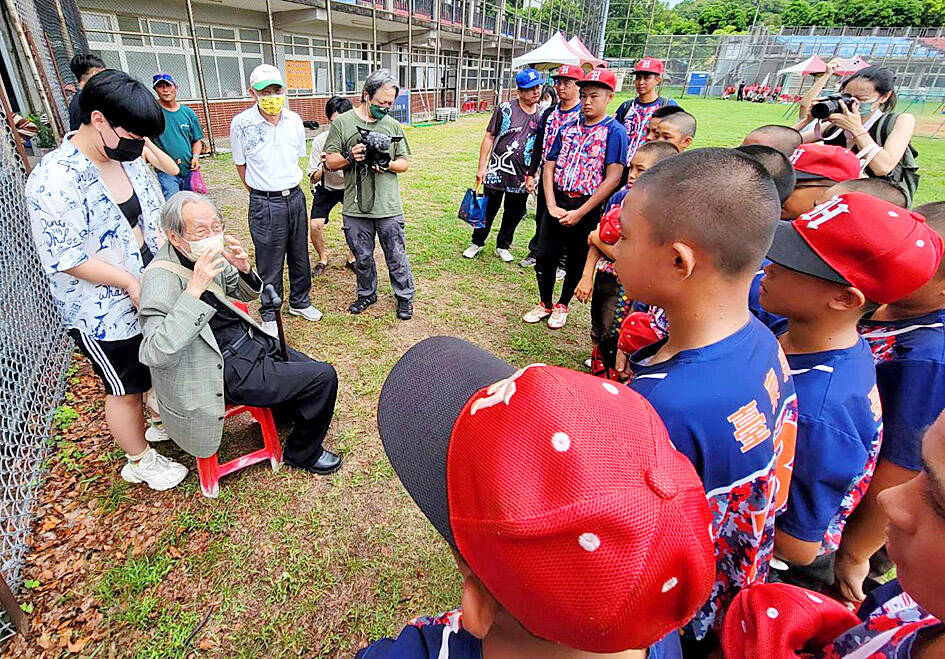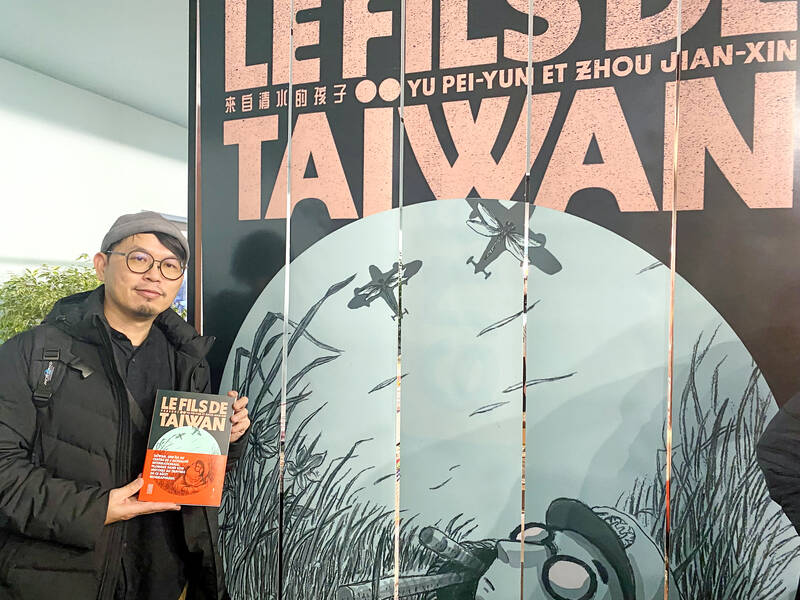Tsai Kun-lin’s (蔡焜霖) life was upended in 1950. Working overtime as a civil servant, he was suddenly taken to a jail, where he was wired up to a machine and electrocuted until he gave up the names of so-called “co-conspirators.”
His supposed crime was joining a “left-leaning” reading club in high school out of a love of literature and academic study.
Tsai, born in Taichung in December 1930, is one of a handful of people still alive who were subjected to political persecution in the White Terror era from 1949 to 1987, when the then-Chinese Nationalist Party (KMT) government had imposed martial law.

Photo: CNA
He endured torture and years of imprisonment at a “labor reform” camp on Green Island (綠島) after he was found guilty of “rebellion and treason.”
Aged 92, he is a living witness to Taiwan’s evolution from authoritarianism into a “full democracy,” a description the Economist Intelligence Unit bestowed upon the nation in its Democracy Index for last year.
Tsai’s and Taiwan’s hard-fought road to freedom were documented in Son of Formosa (來自清水的孩子), a four-book Chinese-language graphic novel, the French version of which attracted local readers at the Angouleme International Comics Festival in France in January.

Photo: CNA
The graphic novel was authored by Taiwanese writer Yu Pei-yun (游珮芸) and illustrator Zhou Jian-xin (周見信).
Yu compiled interviews with Tsai into a linear narrative with Slowork Publishing to deliver what became Tsai’s biography and a “Taiwanese history textbook.”
Tsai’s life was chosen as the focus in the retelling of Taiwan’s Martial Law era because of his experiences and intimate connection to that time in the Republic of China’s history.
Slowork Publishing president and editor Huang Pei-shan (黃珮珊) said that her company was inspired to publish the graphic novel after receiving countless inquiries at international comic book fairs about illustrated works on Taiwan’s history.
Framing the story was a challenge, Zhou said.
Early in the post-martial law period, people still refrained from talking about the White Terror era, he said, adding that even in movies for some time after, filmmakers generally avoided addressing the topic head-on.
“If we present history in an accusatory and critical manner, it may weigh too heavily on readers,” he said. “It could limit how far the story will reach, so we decided to start the narrative with a lighter tone and focus on stories about a boy before slowly diving into Taiwan’s history.”
The team behind Son of Formosa studied graphic novels that dealt with trauma and history, such as US graphic novel Maus and Japanese manga In This Corner of the World, both of which focused on World War II.
It found that those works told tragedies from “positive and humane” perspectives, Zhou said.
While the majority of Son of Formosa centers around the atrocities committed by the then-KMT government, the graphic novel was unbiased, covering the physical insurgency initiated by the people rooted in Taiwan historically against troops that arrived from China.
The heaviest part of Yu and Zhou’s graphic novel centered on how people survived adversity and traveled different paths in life, Zhou said.
“We hope our work can serve as a ‘presentation’ that introduces the perspective and background of each character against the backdrop of history, so readers can draw their own conclusions,” he said.
For example, the figures of authority — those who commit torture in the books — were depicted as either faceless or silhouettes, Zhou said.
“We did not want to simply create two-dimensional villains,” he said. “We wanted to get the readers to think, to ponder what those faceless figures represent. They could mean power, selfishness or even regular people forced to commit atrocities by authorities.”
In addition to Tsai’s past, Son of Formosa tells stories of other people persecuted during the White Terror, including Malaysian-born Taiwanese human rights advocate Chin Him-san (陳欽生).
Chin, who was born in 1949, was imprisoned for 12 years after being accused of involvement in the bombing of the US Information Service in Tainan in 1971.
During his incarceration, when he was held incommunicado, his illiterate mother could find no information about him. She had his name engraved onto a memorial tablet and placed at the alter of his ancestors.
Chin had his sentence overturned in 2019, an act that he said was superfluous, because he was “innocent all along.”
The graphic novel also depicts the murder in Taipei of the mother and seven-year-old twin daughters of former Democratic Progressive Party chairman Lin I-hsiung (林義雄) in 1980, and the self-immolation of publisher Deng Nan-jung (鄭南榕) in 1989 as an act of defiance to voice his dream for Taiwan to have freedom of speech.
It also touches on figures such as Carnegie Mellon University assistant professor of mathematics Chen Wen-chen (陳文成), a supporter of Taiwanese independence whose death in 1981 remains unsolved today.
Former “president Lee Teng-hui’s (李登輝) democratic reforms inspired me and that is what is important, not revolution, but rather peaceful reform,” Tsai said in the book.
The graphic novel has been translated into six other languages — English, Korean, Arabic, German, French and Japanese — with the Japanese version the most popular.

WANG RELEASED: A police investigation showed that an organized crime group allegedly taught their clients how to pretend to be sick during medical exams Actor Darren Wang (王大陸) and 11 others were released on bail yesterday, after being questioned for allegedly dodging compulsory military service or forging documents to help others avoid serving. Wang, 33, was catapulted into stardom for his role in the coming-of-age film Our Times (我的少女時代). Lately, he has been focusing on developing his entertainment career in China. The New Taipei District Prosecutors’ Office last month began investigating an organized crime group that is allegedly helping men dodge compulsory military service using falsified documents. Police in New Taipei City Yonghe Precinct at the end of last month arrested the main suspect,

A cat named Mikan (蜜柑) has brought in revenue of more than NT$10 million (US$305,390) for the Kaohsiung MRT last year. Mikan, born on April 4, 2020, was a stray cat before being adopted by personnel of Kaohsiung MRT’s Ciaotou Sugar Refinery Station. Mikan was named after a Japanese term for mandarin orange due to his color and because he looks like an orange when curled up. He was named “station master” of Ciaotou Sugar Refinery Station in September 2020, and has since become famous. With Kaohsiung MRT’s branding, along with the release of a set of cultural and creative products, station master Mikan

Eleven people, including actor Darren Wang (王大陸), were taken into custody today for questioning regarding the evasion of compulsory military service and document forgery, the New Taipei District Prosecutors’ Office said. Eight of the people, including Wang, are suspected of evading military service, while three are suspected of forging medical documents to assist them, the report said. They are all being questioned by police and would later be transferred to the prosecutors’ office for further investigation. Three men surnamed Lee (李), Chang (張) and Lin (林) are suspected of improperly assisting conscripts in changing their military classification from “stand-by

LITTORAL REGIMENTS: The US Marine Corps is transitioning to an ‘island hopping’ strategy to counterattack Beijing’s area denial strategy The US Marine Corps (USMC) has introduced new anti-drone systems to bolster air defense in the Pacific island chain amid growing Chinese military influence in the region, The Telegraph reported on Sunday. The new Marine Air Defense Integrated System (MADIS) Mk 1 is being developed to counter “the growing menace of unmanned aerial systems,” it cited the Marine Corps as saying. China has constructed a powerful defense mechanism in the Pacific Ocean west of the first island chain by deploying weapons such as rockets, submarines and anti-ship missiles — which is part of its anti-access/area denial (A2/AD) strategy against adversaries — the